ARTICLE AD BOX
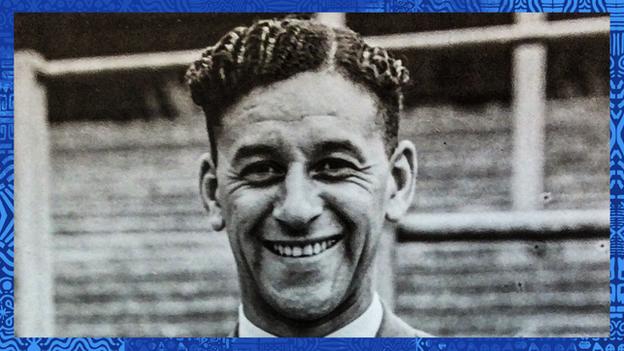 Anthony 'Tony' Collins took Rochdale to their first and only major cup final
Anthony 'Tony' Collins took Rochdale to their first and only major cup finalIt's 26 April 1962 and 11,123 fans have packed out the Spotland stadium in Rochdale.
Two teams take to the pitch for the League Cup final. Fourth Division Rochdale are in the first major final in the club's history after an astonishing run - their first chance at silverware.
Dale manager Anthony 'Tony' Norman Collins has made history as the first manager in the game to reach the final from the Fourth Division but he is about to achieve something else, something that cannot be put in a trophy cabinet.
He leads the team out as the first black man to manage Rochdale.
Dig a little more and you'll find out that he is the first black man to manage at an English major final.
Go through all the archive possible and you'll learn he's actually the first black man to manage in the English Football League at all.
From growing up in London to being stationed in Italy during World War Two and then lighting up the left wing for a handful of clubs - Collins' rise to the top of the game wasn't simple.
Today, there are still only seven black managers among the 92 Premier League and Football League clubs, but Collins was doing it almost 60 years ago.
In a decade in which support for Britain's National Front party gained momentum and Enoch Powell's infamous Rivers of Blood speech was delivered, Collins' achievement of being the Football League's first black manager in the 1960-61 football season should not be understated.
But yet, outside of the clubs that Collins managed or played for, his story has often been marginalised.
Many know the names of the first black players in Britain and heroes from the 1960s and 1970s like Viv Anderson or Clyde Best - less celebrated is the story of the first black manager.
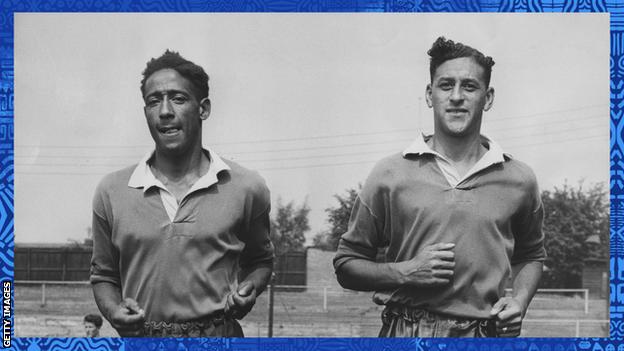 Collins (right) played alongside one of the first black players in England, Roy Brown (left), at Watford
Collins (right) played alongside one of the first black players in England, Roy Brown (left), at Watford- 'No-one remembers my bullet header, just what happened after'
- Marcus Rashford and Alex Scott: Football Black List 2021
- Black History Month 2021: The best of BBC Sport's content

Due to the stigma of having a child out of wedlock in Kensington in 1926, with a white mother and black father, Lou Collins decided that her parents Kit and Wilfried Collins would be better suited to raising her child.
It was here that early family life at their rented property of 397 Portobello Road began to shape a football pioneer: "He was the same as his brothers and sisters and the rest of his family, as far as they were concerned, apart from an obvious difference," Collins' daughter Sarita says.
Collins always referred to his five 'brothers and sisters', though they were his aunties and uncles.
"With them being older, they protected him, and he was a very strong character and very charismatic. He became head boy at school, so he led all the way through his life," Sarita continued.
Head boy became Private 14735335 when Collins was enlisted in the army upon receiving his call-up letter in 1944.
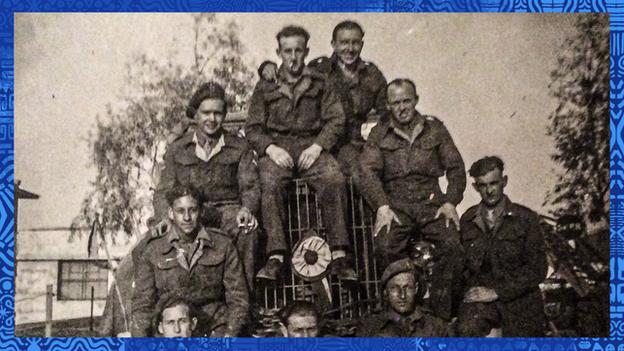 Collins (left of middle row) was stationed in Naples for three years, often organising football games with his comrades
Collins (left of middle row) was stationed in Naples for three years, often organising football games with his comradesCamaraderie was a big thing in his unit, references to where you were born or how you spoke were often used against you. It was inevitable that his skin tone would become a target, but Collins soon ensured that was not to last.
A keen boxer as a young adult - his trainer at the gym once pleaded to Kit that she should let Collins come back to boxing as there was 'money in his left hand' - one scuffle later and Collins had underlined he was not to be messed with in the army.
Aged 21 in 1947, Collins was honourably released from his service. At 5ft 9in and being extremely light of foot it was football that beckoned him.
It just so happens that a young private by the name of Ibbotson had written to Eric Taylor, the manager of Sheffield Wednesday at the time, who upon hearing the recommendation invited Collins down for a trial.
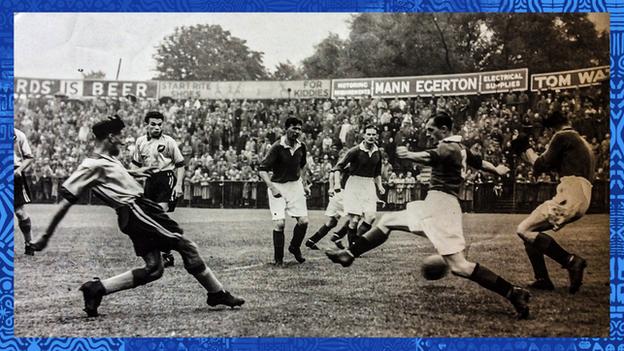 Collins made 333 Football League appearances, scoring 47 goals, before retiring in 1961
Collins made 333 Football League appearances, scoring 47 goals, before retiring in 1961
'One trial enough', wrote one newspaper reporter after seeing Collins turn out for the Owls, with the young footballer signed up as a professional shortly after.
He would never make a first-team appearance for Wednesday, a player deemed good enough by many observers but not by the coaching staff.
His experience at the club wasn't an easy one and despite a good relationship with Taylor, the other coaches weren't as accepting.
Back then players only had one pair of boots and Collins' were far too small for him. Despite asking for another size his request was never granted, leading to incredible pain in his feet and the loss of toenails.
"We all know why Tony was treated like that, looking back it's obvious. He was the only one who had to go through that," says Sarita.
"He would never say it was the colour of his skin though, he never wanted that to be an excuse."
The excruciating pain and lack of opportunities meant a move to York City in the Third Division North.
After York, Collins joined several clubs including Watford, Norwich, Torquay and Crystal Palace, becoming the first black player to appear for the Eagles in 1957.
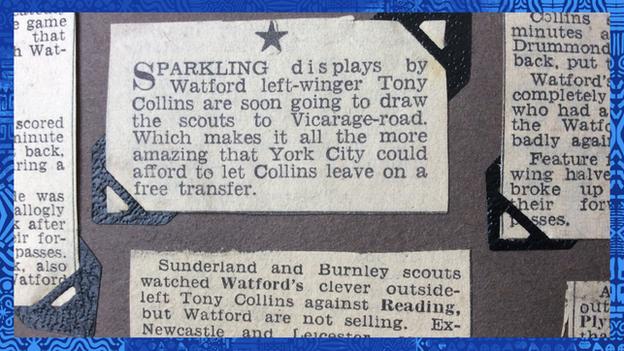 Collins was regularly linked with moves to the First Division, with various scouts coming to watch him
Collins was regularly linked with moves to the First Division, with various scouts coming to watch him
He joined his final club as a player, Rochdale, in June 1959, the club where the managerial career of 'Football's Master Spy' was born.
Following manager Jack Marshall's move to Blackburn, Collins was pushed by teammates to apply for the vacant position.
He had earned the complete respect of his white teammates in a time where this did not come easy for a black man in white British society.
Sarita continues: "He was a strong character, but he was a gentleman. You wouldn't cross him, it was like he was made of iron.
"He wouldn't pull his punches, he told it how it was and that's why he was able to stay so long in the game. People want decisions, people want a definite action and that's what he gave."
The £1,250 salary was agreed and on 5 September 1961, upon taking the full-time role at Rochdale, Collins became the Football League's first black manager.
It took just one year for him to guide the club to the only major final in their history but Second Division Norwich proved too strong, winning 4-0.
Since then only one other club has made it to the League Cup final from the fourth tier, with Bradford City losing 5-0 to Premier League Swansea in 2013.
A frustrated tactician, Collins would take his inspiration from Brazil and continental Europe, attempting 4-2-4 and 3-3-1-3 formations, but a lack of funding meant the cup final was the ceiling.
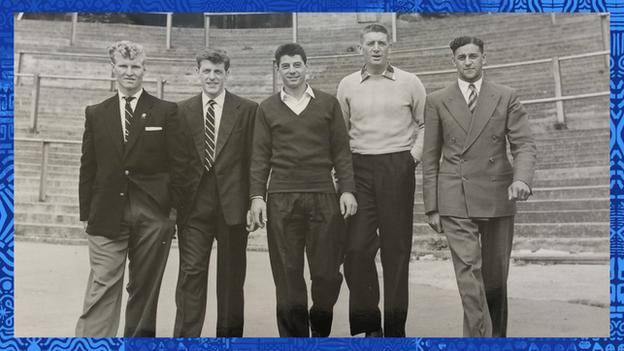 Keith Alexander was often described as the first black manager in the Football League when he took over at Lincoln in 1993, until Collins' achievements became more widely recognised.
Keith Alexander was often described as the first black manager in the Football League when he took over at Lincoln in 1993, until Collins' achievements became more widely recognised.Issues that plague 2021 Rochdale also affected them in the '60s, with splits at board level, financial problems and differing ideas of how the club should be run.
This began to manifest itself on the pitch. Rochdale narrowly missed out on promotion to the Third Division in 1964-65, but in the following two seasons the club had to be re-elected back into the league due to 21st-place finishes.
In October 1967 Collins left Rochdale. He felt his hands were tied, there was little recruitment and his tactical mind could not be put to use.
The town of Rochdale was his heart though, and there was no moving from his house on Edenfield Road with his wife Edith and three children.
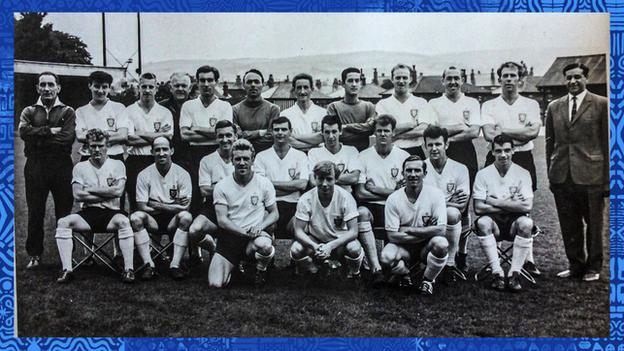 Collins won 132 of his 365 games in charge of Rochdale
Collins won 132 of his 365 games in charge of Rochdale
It was Collins' ability to spot a player that meant Rochdale would be his last full-time managerial appointment.
To ensure he could still live at home in the Greater Manchester town it would be a backroom role that would elevate Collins to the legacy he has now.
In 1968 he found himself as assistant manager to Alan Dicks at Bristol City. He would also go up and down the country on scouting missions, with the press finding it unusual that Collins lived 180 miles from the club.
The situation he found himself in was good, his reputation was growing and this meant he was regularly called up for television interviews.
The scouting was working - players such as Gerry Gow, Tom Ritchie and Dickie Rooks were all signs of this, but similarly to Rochdale, boardroom struggles were problematic.
Collins elevated to chief scout at Leeds United under the great Don Revie, where he built a network of scouts 'spying' - as he called it - for him.
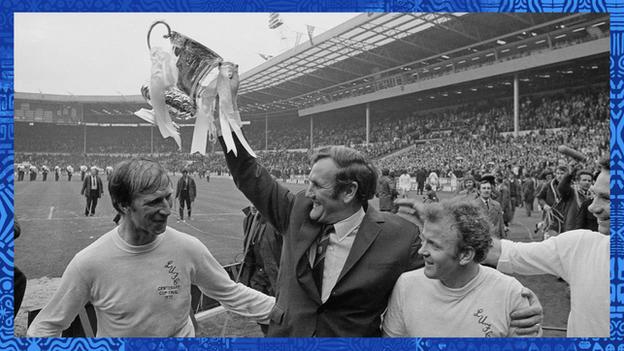 Don Revie won eight trophies in his time as Leeds United manager
Don Revie won eight trophies in his time as Leeds United manager"He was just like a walking encyclopaedia," Sarita remembers.
"He would remember what happened in any game and I've spent many hours in the background listening to him on the phone going through it."
It was different 'spying' in Europe at the time. Language barriers and simply not knowing who players were was usually an issue for clubs but Collins understood the value of these reports.
"One of my most absorbing trips was to Hungary" he wrote in his notes.
"It was to watch our European second-round opponents Ujpest Dozsa. I had to go alone and do my own job, the club secretary and the public relations officer roles.
"In Europe, we have got to be right first time, especially when you take into consideration the money being spent on the trip and the prize that could be be at stake."
Collins' attention to detail helped Leeds reach the European Cup final under Jimmy Armfield in 1975, where they lost 2-0 to Bayern Munich amid a flurry of controversial refereeing decisions.
Now Revie was England manager and due to Collins' domestic and European pedigree, he enlisted his services on a national level for England, to be their 'master spy', compiling match and player reports to every last detail.
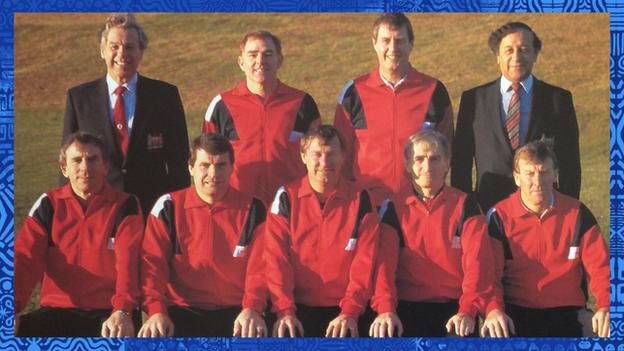 Tony Collins (top, right) alongside Sir Alex Ferguson (centre) and his Manchester United staff
Tony Collins (top, right) alongside Sir Alex Ferguson (centre) and his Manchester United staffCollins would later embark on second spells at Bristol City and Leeds before joining Manchester United where he and a little known Alex Ferguson did not see eye to eye.
An earlier meeting between the two where Collins' Bristol City beat Ferguson's St Mirren was to blame, as well as Manchester United missing out on the signing of John Barnes.
Several minor roles followed but at the age of 80, the domestic, European, and national spy hung up his notepad.
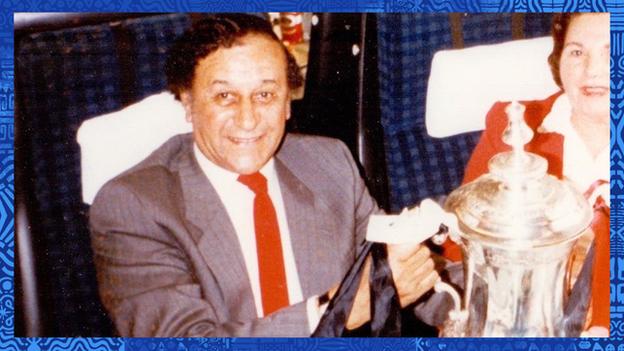 Howard Wilkinson, chairman of the League Managers Association, described Collins as "a true pioneer of the sport"
Howard Wilkinson, chairman of the League Managers Association, described Collins as "a true pioneer of the sport""He was just ahead of his time," says Sarita of her father, who passed away aged 94 in February. "If you compare with the video analysis now, where they can just freeze things and go back over and over again, he had one go in 90 minutes to do a player report."
Little was known about the inner workings of Football's Master Spy, the Football League's first black manager. This is how he worked best - in the shadows conducting business.
Collins' journey took him from organising friendlies against POWs in the war to European Cup finals, to the closest Rochdale have ever come to cup silverware.
Along the way, he inadvertently became a trailblazer.

- Do you have coulrophobia? Find out why clowns have become so spooky
- 'We don't take enough care': Tony Pulis reveals the worst part of being football manager


 3 years ago
111
3 years ago
111
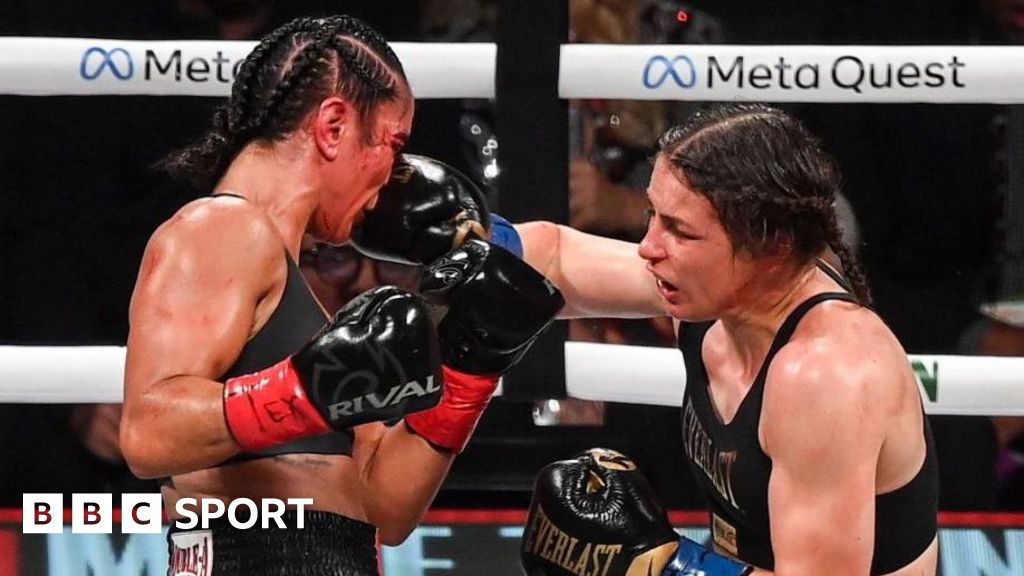

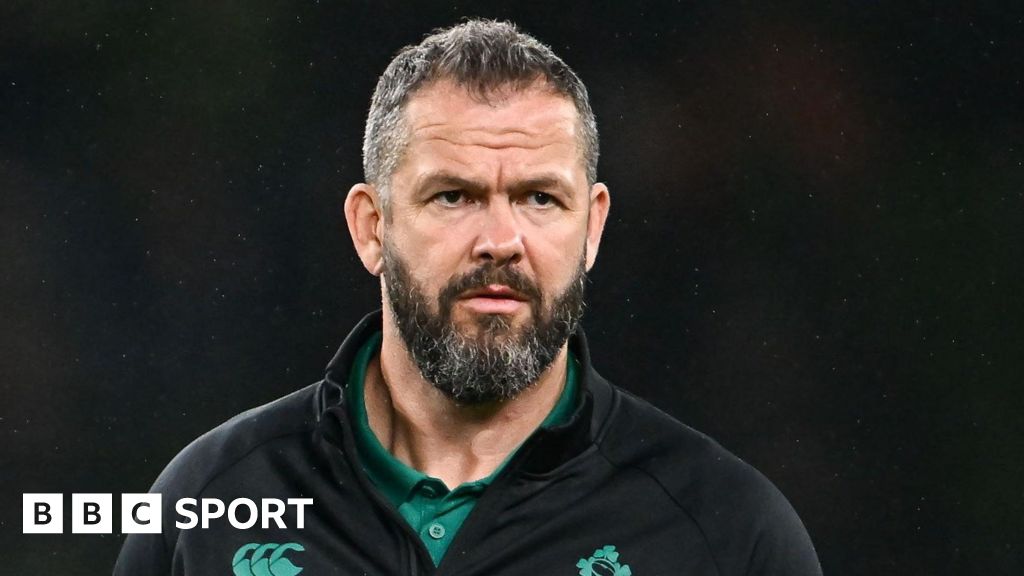





 English (US)
English (US)